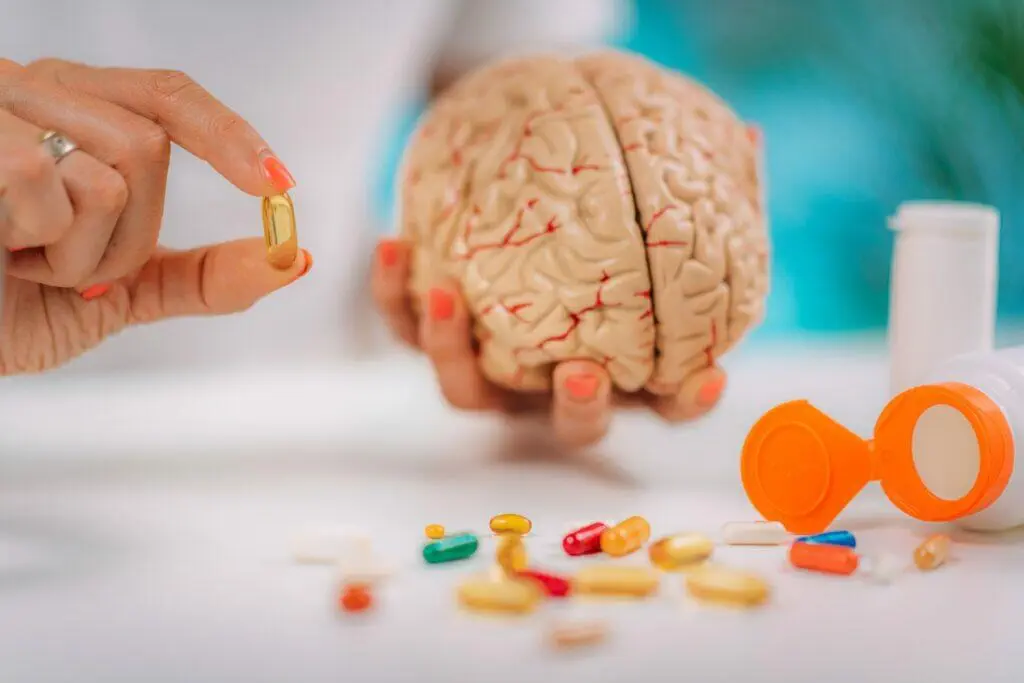Despite what society often tells us, addiction is not just a series of poor choices or a lack of willpower, but a complex brain disease that’s deeply rooted in biology.
The interplay of neurotransmitters, brain structures, genes, and environment plays a significant role in determining why some people become addicted while others do not.
By understanding the biology of addiction, we can help pave the way for greater empathy towards those who are struggling, more effective treatment options, and a deeper insight into the nature of this complex condition.
To truly understand addiction, we must unravel the intricate processes that occur in the brain, the role of genes, and how the environment influences vulnerability to substance abuse and addictive behaviors..
So let’s demystify damaging preconceptions, and explore the science behind addiction.
The brain and addiction
Consistent exposure to addictive substances or behaviors causes your brain to undergo significant alterations. These can affect its standard operational pathways, leading to chronic patterns that are tricky to reverse.
This is why we must view addiction not just as a behavioral response, but also as a physiological one. In this context, we can see how it’s not so simple for someone to “choose” to stop or “exercise more control” over their impulses.
At the heart of these changes is the brain’s adaptive nature. When introduced to addictive substances or behaviors, it doesn’t just experience temporary pleasure. Instead, substances such as opioids or nicotine can cause a significant surge in dopamine, a neurotransmitter associated with pleasure and reward.
This intense response pushes the brain into a new state of functioning, one that starts to prioritize the addictive substance or behavior over other stimuli. Over time, this leads to changes in various cognitive functions, impacting everything from decision-making to memory.
Understanding addiction as a shift in the brain’s functioning is pivotal in both treatment and societal perception. It calls for a move from blame to empathy and from misunderstanding to knowledge.
Understanding the brain’s reward system
Your brain’s reward system is an intricate network of structures responsible for feelings of pleasure and motivation. Rooted deep within the brain, this system has evolved over millions of years to promote behaviors vital to your survival, such as eating and procreating.
Put simply, when you engage in these beneficial behaviors, the reward system releases the neurotransmitter dopamine, which produces feelings of pleasure and satisfaction. This positive reinforcement encourages you to repeat them, ensuring your survival and well-being.
However, the introduction of addictive substances or behaviors can disrupt this system.
For example, in one study, Dr. Nora Volkow, the Director of the National Institute on Drug Abuse (NIDA), employed brain imaging to reveal how drugs impact the dopamine system. Her research visually demonstrated how substance abuse can chronically alter the brain’s reward pathways.
As research continues, our understanding of the brain’s reward system continues to deepen. What’s evident is the system’s critical role in the development of addictive behaviors. By learning more about its function and susceptibilities, we can better address and treat addiction in its various forms.
Genetic predisposition to addiction
Your genes are the codes that make you a completely unique member of the human species. Unfortunately, they can also influence your susceptibility to addiction.
While no single “gene for addiction” exists, many genes can predispose certain individuals to addiction. According to the National Institute on Drug Abuse (NIDA), approximately 40-60% of your propensity for addiction is derived from your genetic makeup. This estimate has been reinforced by research, with one Swedish study finding genes had a significant part to play in the chances of twins facing similar drug abuse issues.
However, your genetic code doesn’t entirely dictate your destiny. It intertwines with your life experiences, producing shifts known as epigenetic changes, which can amplify, diminish, or even silence genes.
The interplay between your genes and your lived experiences is intricate, together molding your risk of succumbing to substance abuse or addictive behaviors. It’s not solely about the genes you inherit but also the environment you navigate.
Epigenetics and environmental influence

Epigenetics is the science of how life events and environmental factors can change the way your genes operate, without altering the DNA sequence itself. This can be visualized as switches that activate or deactivate specific genes.
Dr. Rachel Yehuda’s research demonstrates that experiencing severe stress or trauma can toggle these genetic “switches.” These impact how you react to future stresses, along with your susceptibility to substance abuse or addictive behaviors. Additionally, a 2003 study revealed that certain genetic variations make some people more receptive to the effects of traumatic experiences, potentially leading to conditions like depression.
Environmental elements, ranging from prenatal experiences to adulthood challenges, can also profoundly modify brain chemistry, heightening addiction vulnerability. Aspects like childhood traumas, peer pressure, or financial situations can significantly mold this susceptibility.
Recognizing the intricate relationship between genetics and personal experiences enables the development of more empathetic and holistic treatments for addiction. The intersection of one’s genetic blueprint and life narrative collectively outlines one’s vulnerability to addiction, emphasizing that it’s more than just a lapse in willpower.
Adaptation and tolerance
When you frequently use addictive substances, your brain begins to change and adapt. This isn’t because it’s malfunctioning, but rather trying to keep things balanced amidst the repeated exposure to the substance. However, this remarkable ability of your brain to adapt can become a double-edged sword. Over time, as your brain adjusts, you might find you need more of the substance to feel the same ‘high’ or pleasure, as your tolerance to it builds.
As your tolerance grows, you might end up consuming more, pushing your body and mind further into the grip of addiction. For instance, this comprehensive study (exploring the relationship between alcohol and the brain) showed how chronic use leads to structural changes in the brain’s reward center. So, over time, you might drink more to chase that same initial feeling of pleasure.
What’s more, as your brain gets used to having the substance around, not having it can lead to painful or even dangerous withdrawal symptoms. This means you might consume even more just to avoid these withdrawal effects, getting caught in a tough cycle.
The National Institute on Drug Abuse (NIDA) backs this up, explaining how our brain’s attempts to adapt lead to both increased tolerance and the intense withdrawal symptoms we experience when we try to cut back or quit.
Neurological impacts of withdrawal
When you decide to stop using a substance you’ve become dependent on, your brain doesn’t always take it well. It has adapted to the regular influx of the drug, altering its balance of neurotransmitters and pathways in response. Withdrawal is your brain’s reaction to the sudden absence of this now-familiar substance.
You might feel a range of symptoms, including anxiety, depression, changes in appetite, or even physical pain. This happens because your brain’s natural equilibrium has been disrupted. Certain neurotransmitter systems (like the dopamine or serotonin pathways) formerly suppressed or overstimulated by the drug, now react dramatically to its absence.
Essentially, it’s your brain sounding the alarm, signaling that something it’s come to rely on is now missing.
Brain restoration in addiction treatment

But there’s hope. Your brain is incredibly resilient. At Maui Recovery, we provide a range of addiction treatments and support to help your brain heal and recalibrate. As you stay away from the substance and engage in our holistic treatment methods, your brain can begin its journey of restoration.
Neuroplasticity is your brain’s ability to reorganize itself by forming new neural connections. Over time, with sustained sobriety and therapeutic intervention, you can rebuild pathways and correct some of the imbalances caused by addiction. It’s like a garden recovering after a storm. With the right care and attention, it can blossom once again.
Below are some tried and tested treatments and practices that can help rewire your brain:
Cognitive Behavioral Therapy (CBT)
CBT is like having a conversation with your thoughts. It identifies negative patterns and gives you practical tools to change them. One of the go-to evidence-based treatments for addiction, it helps you understand your triggers and reshape your responses.
Mindfulness, Meditation, and MBSR
Today there are many mindfulness and meditation practices, but they all have their root in the same concept: being present. A growing body of research is showing that the benefits of these practices are indisputable. Not only have they been shown to strengthen neural connections – aiding in enhanced cognitive function – but regular engagement can help rewire the brain, promoting healthier habits and breaking the cycle of addiction.
At Maui Recovery, one of our most successful treatments is MBSR (Mindfulness-Based Stress Reduction). Our structured program blends mindfulness and body awareness – proven to decrease psychological stress and improve well-being.
Nutritional Therapy
When you think about the importance of diet, it’s not just about maintaining physical health; it’s also about nurturing your cognitive well-being. Proper nourishment goes beyond building strong muscles and bones – it plays a pivotal role in ensuring your brain operates optimally.
Nutritional therapy personalizes your dietary intake, zeroing in on essential nutrients that help rejuvenate neural connections which may have been compromised due to substance abuse. As such, it underscores a vital message: the foods you consume can significantly influence your mental and emotional health, aiding in the repair, restoration, and resilience of your neural pathways.
Exercise

Moving your body isn’t just about fitness. Regular physical activity boosts brain health by improving mood, reducing stress, and fostering the growth of new neurons – a process called neurogenesis. Even occasional light exercise enhances blood flow to the brain, supporting cognitive functions and memory.
Furthermore, exercise has been shown to play a pivotal role in addiction recovery, helping to reduce cravings and improve mental well-being.
Neurofeedback
This is brain training in real-time. Neurofeedback provides visual or auditory signals representative of the brain’s activity, enabling individuals to gain direct insight into their cognitive functions. Through this real-time feedback, participants can consciously modify their brain patterns.
Beyond its role as a cognitive enhancer, neurofeedback serves as a therapeutic tool, assisting individuals in addressing and mitigating challenges such as anxiety and mood swings by reshaping associated neural pathways.
Medication-Assisted Treatment (MAT)
MAT combines counseling with medications that balance brain chemistry. These drugs can ease withdrawal symptoms, reduce cravings, and enhance the effects of behavioral therapies. Just ensure you only take such medications under the guidance of a health professional.
Sleep Regulation
As Matt Walker famously pointed out, sleep truly is your superpower! Proper rest restores brain function, enables you to consolidate memories, and balances mood-affecting chemicals. Few things are as important as a good night’s rest for aiding faster recovery and keeping your brain in shape!
Social Connection and Group Therapy

Sharing experiences and feelings in a group goes beyond merely being a supportive act. It catalyzes the release of oxytocin, often dubbed the “feel-good” hormone. Oxytocin plays a pivotal role in fostering social bonds and enhancing feelings of trust and intimacy. When you feel accepted and closely connected to others, it not only strengthens your emotional resilience but also significantly reduces the likelihood of relapse into negative behaviors or patterns.
Learning New Skills
Engaging in a new hobby or learning a novel skill offers more than just a recreational outlet. It provides a robust challenge to your brain, stimulating its cognitive functions. As you delve into these new activities, your brain starts to form fresh neural pathways – a process which not only boosts brain plasticity but also promotes cognitive growth.
Additionally, immersing yourself in such pursuits offers a positive focus, effectively redirecting your energy and attention away from unhealthy habits or tendencies.
How Maui Recovery can help
At Maui Recovery, we understand the biological aspects of addiction and how they intertwine with each person’s unique journey. Our serene setting amidst the natural beauty of Maui offers an ideal environment for the brain to heal. The tranquil surroundings, coupled with our cutting-edge therapeutic practices, provide the necessary combination to counteract the impacts of addiction.
Our luxurious facility is the perfect place to give your brain some much-needed rest and relaxation. When this beautiful, calming setting is coupled with our holistic approach – one that aligns with your body’s natural rhythm – you can foster genuine, lasting recovery.
What’s more, our personalized treatment programs combine evidence-based therapies with experiential therapies; a blend expertly tailored to help you tap into your inner mana!
If you’re seeking a sanctuary where biological understanding meets world-class therapeutic practices, Maui Recovery is the place.
Contact us today and give yourself or your loved one the chance to heal and rediscover life beyond addiction.









